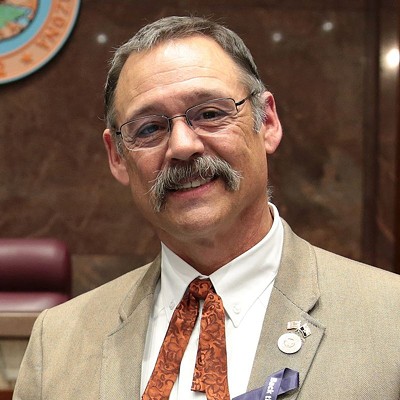First elected to the board in 1988, Grijalva built a political machine by melding anti-development environmentalism with old-fashioned patronage. Successfully positioning himself as an irritant to the establishment, he easily dispatched any political opponent foolish enough to enter the ring with him.
When Grijlava resigned earlier this year to pursue a seat in the new Congressional District 7, his erstwhile colleagues on the board were left with the job of appointing a successor. The job went to Richard Elias, a native Tucsonan who must now defend his post against challenger Frank Felix in a special election in the September 10 primary.
Elias, 43, remembers his political awakening came when he was just 10 years old, after his grandfather took him to hear farm union legend César Chávez in the basement of downtown's All-Saint's Church. "I distinctly remember leaving there and telling my grandfather, I'm going to be like him," Elias says.
A Salpointe Catholic High School grad, Elias earned a degree from the UA in history in 1988. While attending college, he served as a union steward while working at a Fry's grocery store.
Out of college, Elias' career has mostly revolved around low-income housing, including a job at Chicanos por la Causa. He's built up his political network by serving on a number of committees and boards, including the Pima County Board of Health's TCE subcommittee, the Bank One Community Advisory Committee, the county's development impact fee appeals board and the Southern Arizona Center Against Sexual Assault. When the District 5 seat opened up, he threw his name into the mix and came out of top, thanks to support from Democrats Dan Eckstrom and Sharon Bronson.
In his first run for office, Elias has wrapped himself tightly in Grijalva's coattails. His campaign office is next door to Grijalva's congressional campaign office, his campaign signs are often side-by-side with those of his predecessor and he promises to follow in "Raul's progressive footsteps."
With Elias hugging Grijalva's record, his opponent is coming on as a reformer. Felix says the county must restore its credibility with voters in the wake of scandals related its procurement program.
Felix, 55, has strong credentials when it comes to reform. Like Elias, he's a native Tucsonan who grew up downtown and graduated from Salpointe. While still in high school, he landed a job working as a photo tech with shutterbugs from the daily papers. In college, he majored in political science, but worked as a cameraman at the university's PBS affiliate, KUAT-TV.
The gig would change his life when he met legendary Arizona Congressman Mo Udall on a shoot. Mo took a shine to Felix and, a few months later, invited him to come work on his staff. Felix remembers Udall teaching him to have respect for process and procedures and to listen to divergent views and work toward consensus. "He was a master at that," Felix says reverently.
After a year in D.C., Felix returned to Arizona. He was the youngest person elected to the state Senate when he won his seat in 1972. During his three terms, Felix counts among his proudest accomplishments the passage of laws that forced public officials to meet in the open and for state lawmakers to disclose gifts from lobbyists.
While serving in the Legislature, Felix continued attending the UA, earning a master's in political science and a Ph.D. in education administration. After leaving the Capitol, he worked in various administrative posts at the UA, including student services, scholarship development and the Udall Center for Public Policy. In the last two years, he's been working to create a public foundation to support music education in Arizona classrooms. He's also taught classes at Pima Community College and Northern Arizona University.
Felix says he decided to run for the board because he was concerned about the county's administration following reports on the county's controversial procurement program, particularly regarding the 1997 road bond package.
"It's time for a change," Felix says.
Elias acknowledges that there's a perception of corruption in the county's procurement process, but says he doesn't know how justified that perception is.
"I've been around here for awhile but certainly I've been around government long enough to know there are flaws in any possible system," says Elias. Last week, he joined other supervisors to vote to adopt recommendations from a citizen committee to reform the procurement department.
Elias puts land use at the top of his agenda. He's built solid green credentials by declaring his staunch support for the Sonoran Desert Conservation, hiring onetime environmental reporter and environmental activist Keith Bagwell as a chief aide and snubbing the Southern Arizona Homebuilders Association's endorsement process, saying he thought it a waste of time to interview with the organization's political committee.
"I meet with members of the Southern Arizona homebuilders on a regular basis and I will continue to do so," Elias says. "My door is open to everybody. But this is a request from their political action committee to come in for a political endorsement and ... frankly I didn't feel that I wanted that endorsement from that political action committee."
The snub has encouraged many developers to pour money into Felix's campaign. Although campaign finance reports aren't due until this week, Felix admits that much of his money is coming from the Growth Lobby. Felix says he needs the money to get elected, but that he's not up for sale. "All it buys them is a returned phone call," he says.
When it comes to land use, Felix says he supports the broad concepts behind the Sonoran Desert Conservation Plan, but says details need to be ironed out and more players need to be at the table.
Like Elias, Felix supports raising the county's $1,550 transportation impact fee to at least $3,000.
The winner of the Democratic primary will face no opposition in the November general election.

















